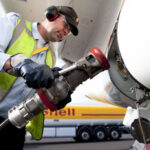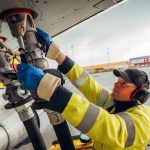With the European Commission due to unveil on February 26 its Clean Industrial Deal, a strategy to boost the EU’s energy-intensive industries and emerging clean-tech sectors, aviation stakeholders that include airlines, airports, fuel producers and NGOs have urged priority support by the Commission for domestic production of e-SAF. The Project SkyPower coalition, which is supported by more than 70 companies and organisations, has written an open letter to European policymakers outlining five key policy interventions to help kick-start an e-SAF industry. While around two million tonnes of e-SAF production capacity from 30 large-scale e-SAF projects have been announced in Europe, no final investment decisions (FIDs) have been reached on any. EU Sustainable Transport Commissioner Apostolos Tzitzikostas told a T&E event in Brussels that the Commission would look at a pricing support mechanism for e-fuels.
“The Clean Industrial Deal will set the stage for a robust and competitive sustainable European industry, and it will pave the way for a Sustainable Transport Investment Plan (STIP) that we are currently preparing,” said Tzitzikostas.
He acknowledged the current EU regulatory framework was not stimulating market investment at the level needed, adding: “I understand the financial outlook remains challenging, with price volatility and revenue uncertainties for early adopters.
“Investment is what we desperately need today to accelerate the use of cleaner fuels – so we will also look at a new mechanism to reduce the price gap for domestically-produced synthetic fuels and at a revenue guarantee for first movers,” promised Tzitzikostas. “We need to make bold investments today to take advantage of this opportunity tomorrow.”
He cited last year’s Draghi report on EU competitiveness that estimated the cost of decarbonising European aviation at €60 billion ($63bn) a year. “EU and member state budgets simply cannot fund this sum,” he cautioned. “So we need a mechanism on how to leverage both public and private investment. We are still working on the concept of the STIP but this is what it is going to be about.”
A European e-SAF industry, says the Project SkyPower coalition, could accelerate the broader energy transition, improve energy security, attract renewed investment into the region’s chemical industry and by 2050 create around 20,000 jobs and capture a share of a potential €350 billion global market, while abating 400 million tonnes of annual global CO2e emissions.
The coalition is calling for the recycling of EU ETS revenues from aviation to capitalise a market intermediary between hydrogen and e-fuel producers on one side and aviation offtakers on the other through double-sided auctions, using the ETS revenues to bridge the price difference. This would create long-term revenue certainty from creditworthy offtakers and enable short-term management of price risk, it says.
To incentivise first movers, the coalition also calls for the establishment this year of a bridging mechanism until the market intermediary comes online, in order to give first movers priority access to the new funding instrument. This would enable FIDs to be taken before the instrument is operational, in time to meet the ReFuelEU e-SAF sub-mandates in 2030/31.
Other near-term interventions recommended include the provision by the EU of long-term certainty over the continued enforcement of e-SAF mandates, production criteria and penalty systems, plus a reduction of project-on-project risk through a backstop mechanism to provide a level of protection for lost revenues.
“Leading companies across the EU’s energy and aviation industries are actively laying the foundations to support first e-SAF projects in getting to FID,” says the Project SkyPower letter. “However, certain barriers are slowing this down, including the lack of revenue certainty, perceived regulatory uncertainty and the unique risk profile of first-of-a-kind e-SAF projects. These barriers need to be addressed for the private sector to accelerate action. As the EU’s e-SAF sub-mandates are at risk of not being fulfilled, additional policy support is needed.”
Representing the 70 signatories to the letter, Marjan Rintel, CEO of KLM and co-chair of Project SkyPower on behalf of Air France-KLM, said: “As aviation leaders, we collectively agree that an enabling policy and funding framework is urgently required to kick-start production at scale. We call on EU policymakers to support the aviation sector to reach its climate ambitions.”
As an airline signatory serving a Nordic region that has abundant renewable energy required for e-SAF production and where a number of e-SAF projects are in the FID pipeline, SAS CEO Anko van der Werff said: “We are committed to forging a path to a sustainable future, where innovation and shared responsibility drive progress for both our planet and our societies. E-SAF is a critical part of the solution. However, industry efforts are not enough – decisive policy action is needed to scale up e-SAF production, drive real industry change and solidify Europe’s leadership in sustainable aviation.”
Amy Hebert, co-chair of Project SkyPower and CEO of Arcadia eFuels, which is intending to build e-SAF facilities in the UK, US and Denmark, said: “The window of opportunity is here and now for the EU to take leadership in the global e-SAF market. Accelerating this critical technology towards commercial operation by 2030 requires the right policy framework and incentives, right now. We need this to be a strategic priority for the EU and for our legislators to provide the regulatory certainty and de-risking required to unlock FIDs for first-of-a-kind e-SAF plants.”
Meanwhile, the Skies and Seas Hydrogen-fuels Accelerator Coalition (SASHA), which has Project SkyPower e-SAF producer members but is not a signatory to the letter, has published a position paper ahead of the Clean Industrial Deal release. It calls for policy that is targeted at developing green hydrogen solutions, meeting mandated decarbonisation targets and securing European competitiveness in the shipping and aviation sectors, as well as the e-fuels industry. It joins the call for ambitious e-fuel support mechanisms, including a contract for difference scheme to support production.
The group also calls for a strengthening of the e-fuel sub-mandate, the creation of a market for zero emission flight by introducing a legally-binding mandate and an expansion of the EU ETS scope to include extra-EU flights and non-CO2 emissions.
Recording of the event on February 18 organised by Transport & Environment (T&E):
Top image: Arcadia eFuels has appointed BNP Paribas as its financial advisor to assist in raising the necessary capital for the development of the Vordingborg production facility in Denmark















More News & Features
Swiss advanced SAF technology startups Metafuels and Synhelion reach project milestones
PtX fuels have significant Asia-Pacific potential but face many barriers, finds report
EU states to mobilise 500 million euro support for early-mover eSAF production startups
European Commission announces Sustainable Transport Investment Plan to advance low-and-no-carbon fuels
SkyNRG says e-SAF and carbon removals should not be competing strategies for aviation decarbonisation
Catagen launches SAF production company and signs offtakes with Ryanair and Shell